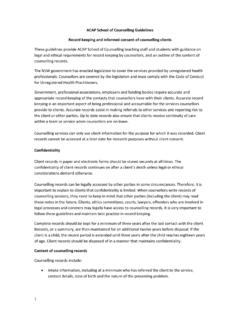Transcription of Informed Consent: A professional and ethical …
1 Practice Matters was created as an educational resource for social workers in Newfoundland and Labrador. It is intended that this resource will generate ethical dialogue and enhance critical thinking on issues that impact social work practice. Practice Matters is provided for general information. Informed consent : A professional and ethical responsibility Annette Johns MSW, RSW Social workers have an ethical and legal responsibility to seek Informed consent from clients prior to the delivery of services and throughout the duration of the social worker-client relationship. When client participation in a service or program is required by law or court order, social workers engage clients in decision-making to the greatest extent possible. This edition of Practice Matters will explore the use of Informed consent in social work practice.
2 What is Informed consent ? Informed consent is defined in the CASW Code of Ethics (2005) as a voluntary agreement reached by a capable client based on information about foreseeable risks and benefits associated with the agreement ( , participation in counselling or agreement to disclose social work report to a third party) (p. 10). The Social Work Dictionary (2014) defines Informed consent as the granting of permission by the client to the social worker and agency or other professional person to use specific intervention, including diagnosis, treatment, follow-up and research. This permission must be based on full disclosure of the facts needed to make the decision intelligently. Informed consent must be based on knowledge of the risks and (p. 216). Informed consent is integral to the therapeutic alliance between a client and social worker, and is in keeping with a client s right to self-determination, autonomy, dignity, privacy and respect.
3 The following ethical principles as outlined in the CASW Code of Ethics (2005) are important: Practice Matters Practice Matters Practice Matters May 2016 Social workers respect the unique worth and inherent dignity of all people and uphold human rights. Social workers uphold each person s right to self-determination, consistent with that person s capacity and with the rights of others. Social workers respect the client s right to make choices based on voluntary, Informed consent . According to Reamer (2003) the Informed consent process is one of the clearest expressions of social workers respect for clients rights . This is also in keeping with the ethical value of integrity in social work practice. There are two important elements captured in the definitions of Informed consent .
4 Firstly, consent must be given voluntarily, without pressure or bias. Holman (2012) notes that practice with clients based on Informed consent implies a partnership with clients working together to make the best decisions possible, according to the wishes/values of the client and using the social worker s expert information (para. 2). Secondly, capacity is extremely important. In order for Informed consent to be valid, the client must have the capacity to provide consent . The CASW Code of Ethics (2005) defines capacity as the ability to understand information relevant to a decision and to appreciate the reasonably foreseeable consequences of choosing to act or not to act (p. 26). The following sections from the CASW Guidelines for ethical Practice (2005) are important: Social workers promote the self-determination and autonomy of clients, actively encouraging them to make Informed decisions on their own behalf ( ).
5 Social workers evaluate a client s capacity to give Informed consent as early in the relationship as possible ( ). What Should Informed consent Include? Informed consent should include all the information a client needs to make a reasonable decision on whether to access social work services. Addressing the limits to confidentiality is a significant part of Informed consent . However, it is important to recognize that Informed consent extends beyond the provision of information on how and when client information will be disclosed or shared. Section of the CASW Guidelines for ethical Practice highlights the following areas to be addressed by social workers as part of the Informed consent process: the nature of the social work service being provided Practice Matters Practice Matters May 2016 the recording of information and who will have access to such information the purpose, nature, extent and known implications of the options open to them the potential risks and benefits of proposed social work interventions their right to obtain a second opinion or to refuse or cease service (recognizing the limitations that apply when working with involuntary clients) the client s right to view professional records and to seek avenues of complaint the limitations on professional confidentiality It is important to note that the client s right to view professional records should be done in accordance with provincial legislation governing access to records.
6 While providing information on the risks and benefits of the proposed social work interventions is essential in obtaining Informed consent , social workers should also engage clients in dialogue about the risks/benefits of not engaging in social work interventions (CASW, 2007). Another element that is fundamental to the Informed consent process is the provision of information pertaining to the termination of the social worker-client relationship. The concept of termination is not something that should be left until the last session. Clients will need information on how long the therapeutic intervention will likely take and how termination will be handled. It is also important for social workers to provide clients with information pertaining to their use of technology in practice. This may include policies on the use of videoconferencing, telephone consultations, and texts or e-mails.
7 Social workers should also share their social media policies with clients. For example, it may be advantageous at the beginning of the therapeutic relationship to let clients know that you do not accept Facebook friend requests from clients or former clients. Deciding what information to share with a client is based on the reasonable person standard what an ordinary, reasonable person would need and want to know about what is being proposed in order to make a decision (Holman, 2012, para. 4). Social workers use professional judgment and share information relevant to the context of practice and client needs; balancing this information so as not to overwhelm the client and impede decision-making. Informed consent also requires that information be provided in a manner that is easily understood by the client and culturally appropriate.
8 As capacity can change over time and fluctuate based on a number of factors, it is important that social workers continue to assess capacity throughout the social worker-client relationship as necessary for Informed consent to be achieved. It is also important that social workers obtain consent relevant to each decision ( , use of a therapeutic approach, sharing of information to a third Practice Matters Practice Matters May 2016 party, referral to another professional , etc.) rather than a general or ambiguous consent form that may be used by an agency or the social worker. Case Scenarios The following case scenarios will explore the issue of Informed consent within the context of social work practice. These scenarios are designed to generate further dialogue and discussion amongst social workers across diverse fields of practice.
9 Scenario 1 Kaitlyn, RSW works in the area of mental health. She recently obtained certification in the use of Eye Movement Desensitization and Reprocessing (EMDR). She feels that many of her current clients would benefit from this therapeutic approach. What does Kaitlyn need to consider in relation to Informed consent ? Social workers have a professional responsibility to discuss with clients their theoretical orientation and use of treatment interventions ( , solution focused therapy, cognitive-behavioral therapy, etc.) during the initial stage of the social worker-client relationship and throughout the relationship as needed. Social workers using complementary and adjunct therapies and techniques must also inform clients about these specific modalities. In 2011, the NLASW released a guideline document for registered social workers using complementary and adjunct therapies and techniques in practice.
10 It highlighted the need for social workers to: engage in a process of clear Informed consent with the client determine that the form of intervention is in the best interest of the client clearly assess personal competence to engage in the use of the specific therapy or technique maintain appropriate professional boundaries Prior to introducing or using complementary and adjunct therapies and techniques in practice, the Informed consent of clients is required. Clients should be provided with information on the therapeutic approach, its effectiveness, and risks/limitations of the therapy. The client should be given the opportunity to ask questions, and to have those questions answered competently and without bias. In addition, whenever a new therapeutic intervention is introduced, social workers should provide clients with information on other therapy options that exist so that the client can make an Informed decision on what is in their own best interest.












